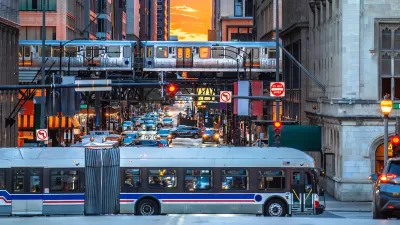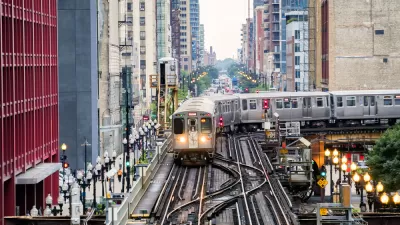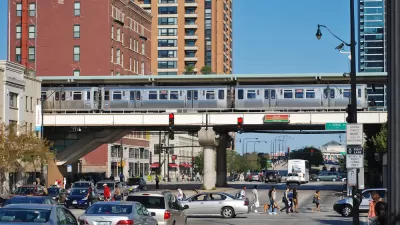A dire warning from regional transit leaders paints a bleak scenario for traffic if agencies are forced to cut service.

Officials from Chicago’s Regional Transportation Authority (RTA) are warning that traffic in the city’s North Side could “grind to a halt” as funding for transit runs out, reports David Struett in the Chicago Sun-Times.
If the state increases spending by 20 percent, the agencies could add 30 to 40 percent more trains and buses, according to a presentation from the RTA. “A bill working its way through the state Legislature seeks to do something like that. The Metropolitan Mobility Authority Act would pump $1.5 billion a year into the area’s public transit, though legislators first want reforms, such as potentially combining the Chicago area’s four agencies into one.”
Without additional state funding, the Chicago Transit Authority, Metra and Pace face a $730 million debt after 2026, forcing service cuts that could almost double travel times in some areas. If the agencies are forced to cut service, “The Chicago area could see a $2.6 billion loss in gross domestic product, largely driven by about 27,000 jobs that are lost in the first year.” A study from the U.S. Department of Energy’s Argonne National Laboratory and MIT found that service cuts could result in a loss of roughly $35 billion in economic activity annually.
The RTA wants state legislators to give it more control over the other three agencies, arguing that “The changes could bring more federal money to Chicago-area transit projects, since federal grants increasingly want to see ‘regional vision and coordination in projects.’” The agencies largely oppose a proposal to consolidate them into one regional agency.
FULL STORY: Traffic may 'grind to a halt' after transit COVID-19 grants run out, RTA warns

Planetizen Federal Action Tracker
A weekly monitor of how Trump’s orders and actions are impacting planners and planning in America.

Congressman Proposes Bill to Rename DC Metro “Trump Train”
The Make Autorail Great Again Act would withhold federal funding to the system until the Washington Metropolitan Area Transit Authority (WMATA), rebrands as the Washington Metropolitan Authority for Greater Access (WMAGA).

The Simple Legislative Tool Transforming Vacant Downtowns
In California, Michigan and Georgia, an easy win is bringing dollars — and delight — back to city centers.

The States Losing Rural Delivery Rooms at an Alarming Pace
In some states, as few as 9% of rural hospitals still deliver babies. As a result, rising pre-term births, no adequate pre-term care and "harrowing" close calls are a growing reality.

The Small South Asian Republic Going all in on EVs
Thanks to one simple policy change less than five years ago, 65% of new cars in this Himalayan country are now electric.

DC Backpedals on Bike Lane Protection, Swaps Barriers for Paint
Citing aesthetic concerns, the city is removing the concrete barriers and flexposts that once separated Arizona Avenue cyclists from motor vehicles.
Urban Design for Planners 1: Software Tools
This six-course series explores essential urban design concepts using open source software and equips planners with the tools they need to participate fully in the urban design process.
Planning for Universal Design
Learn the tools for implementing Universal Design in planning regulations.
Smith Gee Studio
City of Charlotte
City of Camden Redevelopment Agency
City of Astoria
Transportation Research & Education Center (TREC) at Portland State University
US High Speed Rail Association
City of Camden Redevelopment Agency
Municipality of Princeton (NJ)





























